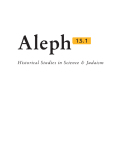
Aleph-Historical Studies in Science & Judaism
Scope & Guideline
Navigating the Intersections of Knowledge and Belief
Introduction
Aims and Scopes
- Interdisciplinary Historical Analysis:
The journal encourages studies that bridge history, science, and Jewish studies, examining how Jewish intellectual traditions interacted with scientific developments. - Focus on Medieval Jewish Scholarship:
A significant emphasis is placed on the works of medieval Jewish scholars, such as Maimonides and Abraham Ibn Ezra, investigating their contributions to science and philosophy. - Exploration of Textual Transmission:
Research often delves into the transmission and translation of scientific texts within Jewish communities, highlighting how these texts influenced and were influenced by the surrounding cultures. - Contextual Studies of Scientific Practices:
The journal aims to contextualize scientific practices among Jewish scholars, exploring how cultural, religious, and societal factors shaped their scientific inquiries. - Critical Re-evaluation of Historical Figures:
A unique contribution is the critical re-evaluation of historical figures and their works, reconsidering their impact and legacy in both Jewish and broader scientific contexts.
Trending and Emerging
- Revisiting Classical Texts:
There is an emerging trend in revisiting and reinterpreting classical texts of Jewish scholars, such as Maimonides and Ibn Ezra, to uncover new insights into their scientific and philosophical contributions. - Integration of Astronomical Studies:
Recent papers have increasingly focused on astronomical studies within the context of Jewish scholarship, reflecting a growing interest in how Jewish scholars engaged with and contributed to the field of astronomy. - Analysis of Medicinal Practices:
Emerging themes include detailed analyses of historical medicinal practices within Jewish communities, as indicated by the examination of texts related to medicinal measures and weights. - Focus on Calendar Systems:
The exploration of Jewish calendar systems, particularly in the diaspora, has gained traction, highlighting how these systems reflect broader cultural and scientific understandings of time. - Methodological Innovations in Textual Analysis:
There is a notable trend toward employing innovative methodologies in textual analysis, including the use of computational tools to analyze historical texts and their contexts.
Declining or Waning
- Modern Scientific Applications of Historical Jewish Thought:
There appears to be a waning interest in directly applying historical Jewish thought to contemporary scientific discussions, with fewer papers bridging ancient wisdom and modern scientific practices. - Studies on Non-Jewish Influences:
Research explicitly focusing on non-Jewish influences on Jewish scientific thought has become less frequent, possibly indicating a shift towards a more insular examination of Jewish contributions. - Exploration of Lesser-Known Figures:
The exploration of lesser-known Jewish scholars and figures in the scientific domain seems to be diminishing, with a greater focus on more prominent figures like Maimonides and Ibn Ezra. - Interdisciplinary Cross-Cultural Studies:
There is a noticeable decline in studies that examine cross-cultural influences between Jewish and other scientific traditions, as the journal has increasingly concentrated on Jewish scholarship in isolation.
Similar Journals
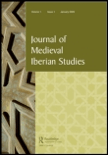
Journal of Medieval Iberian Studies
Connecting Cultures Through Medieval ScholarshipThe Journal of Medieval Iberian Studies is a leading academic journal published by Routledge Journals, Taylor & Francis Ltd, dedicated to exploring the diverse and rich tapestry of medieval Iberian history and culture. With its ISSN 1754-6559 and E-ISSN 1754-6567, this journal serves as a vital resource for scholars engaged in the fields of cultural studies and history, attaining a prestigious Q1 ranking in both categories as of 2023. The journal is recognized for its significant contribution to the humanities, featuring peer-reviewed articles that foster innovative research and critical discourse on medieval Iberia from 2010 to 2024. Spanning an array of topics, it encapsulates interdisciplinary approaches to medieval studies, making it an essential publication for researchers, professionals, and students alike who seek to deepen their understanding of this pivotal period in history. Although it currently does not offer open access options, the journal is committed to advancing scholarly discussion and knowledge dissemination within the academic community.
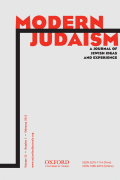
MODERN JUDAISM
Illuminating the Intersection of History and ModernityMODERN JUDAISM is a premier journal dedicated to the multifaceted exploration of Jewish culture, history, and religious practice, providing a significant platform for scholarly discourse since its inception in 1981. Published by Oxford University Press Inc in the United States, this journal stands out with its diverse engagement across disciplines, reflected in its commendable 2023 category quartiles: Q2 in Cultural Studies and History, Q1 in Religious Studies, and notable rankings in Political Science and Sociology. With an impact factor that underscores its rigorous peer-review process and scholarly relevance, MODERN JUDAISM serves as an essential resource for researchers, professionals, and students alike, fostering an academic environment conducive to innovative ideas and comprehensive studies. Although not open access, the journal remains crucial for anyone looking to deepen their understanding of contemporary Jewish thought and its intersection with broader cultural and political currents. For further inquiry or submissions, please refer to the Journals Department at 2001 Evans Rd, Cary, NC 27513.
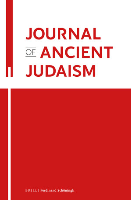
Journal of Ancient Judaism
Uncovering the Historical Depths of Judaism's LegacyThe Journal of Ancient Judaism is an esteemed academic publication focusing on the dynamic field of religious studies, particularly the historical and cultural contexts of ancient Judaism. Published by BRILL, a reputable international publisher known for its scholarly contributions, this journal is dedicated to advancing the study of ancient Jewish texts, traditions, and their socio-political environments. With an ISSN of 1869-3296 and an E-ISSN of 2196-7954, the journal has established its footprint in the scholarly community, supported by its ranking in the Q3 quartile for Religious Studies in 2023 and a Scopus rank of #371 out of 644 in its category. The content showcased in this journal is vital for researchers, professionals, and students alike, offering peer-reviewed articles that contribute to the broader understanding and appreciation of ancient Jewish heritage and its influence on contemporary religious thought. With a timeline spanning from 2015 to 2024, the journal aims to facilitate rigorous academic discourse and provide open access to vital research findings, fostering a deeper engagement with the complexities of ancient Judaism.

Review of Rabbinic Judaism
Engaging Minds with the Complexity of Rabbinic TextsReview of Rabbinic Judaism is a distinguished academic journal published by BRILL, focusing on the intricate history and development of Rabbinic Judaism from its origins to contemporary implications. Since its inception in 1998, it has catered to a broad audience of researchers, professionals, and students interested in the historical and religious dimensions of Judaism. The journal is currently recognized within the Q2 category in both History and Religious Studies as of 2023, indicating its significant role in scholarly discourse. Although it is not an Open Access journal, it remains accessible through various academic institutions and libraries globally. The journal's broad scope allows for diverse articles that explore theological, cultural, and textual analysis, making it a vital resource for those dedicated to the study of Jewish texts and traditions. Located in the Netherlands, Review of Rabbinic Judaism continues to contribute to the academic landscape by fostering a deeper understanding of Rabbinic thought.
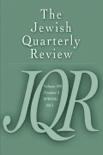
JEWISH QUARTERLY REVIEW
Cultivating Critical Perspectives on Jewish LifeJewish Quarterly Review, published by University of Pennsylvania Press, is a distinguished academic journal that delves into the multifaceted realms of Jewish culture, history, and religious studies. With a rich publication history dating back to 1953 and an impressive track record of rigorous scholarship, this journal maintains a Q2 ranking in key categories such as Cultural Studies, History, and Religious Studies in 2023, placing it among the top-tier journals in its field. The ISSN number 0021-6682 and the E-ISSN 1553-0604 ensure that its scholarship is widely accessible and traceable in academic databases. While the journal is not open access, it remains an essential resource for researchers, professionals, and students seeking in-depth analysis and perspectives on Jewish thought and heritage. The JQR is known for its editorial commitment to enhancing understanding and dialogue across cultural and historical contexts, making it an invaluable asset for anyone engaged in Jewish studies and related disciplines. With its headquarters in Philadelphia, PA, the journal continues to foster scholarly engagement and critical discourse on Jewish identity and experience through its carefully curated articles and reviews.

Miscelanea de Estudios Arabes y Hebraicos-Seccion Hebreo
Celebrating Diversity in Linguistic and Cultural ScholarshipMiscelanea de Estudios Arabes y Hebraicos-Seccion Hebreo is a distinguished interdisciplinary journal published by Universidad de Granada, Editorial, focusing on the intricate fields of Arabic and Hebrew studies. Established in 1955, this open-access journal promotes scholarly discourse and research, allowing free access to its articles, which enhances the dissemination of knowledge. With an ISSN of 1696-585X and an E-ISSN of 2340-2547, the journal has garnered attention in various academic categories, reflecting its relevance and impact: achieving Q2 rankings in both Literature and Literary Theory and Religious Studies, as well as a Q3 ranking in Cultural Studies and History as of 2023. Operating from its base in Granada, Spain, Miscelanea de Estudios Arabes y Hebraicos-Seccion Hebreo contributes significantly to the advancement of cultural understanding, and its accessibility since its inception underscores its commitment to fostering academic excellence. Researchers, professionals, and students interested in the rich interplay between linguistic, cultural, and historical contexts will find this journal an invaluable resource for their studies.
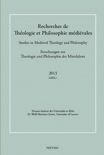
Recherches de Theologie et Philosophie Medievales
Bridging History and Philosophy Through Scholarly InsightRecherches de Theologie et Philosophie Medievales is a distinguished scholarly journal dedicated to the exploration of medieval theology and philosophy, published by PEETERS in Belgium. With an ISSN of 1370-7493 and an E-ISSN of 1783-1717, it has become an essential resource for researchers and scholars within its domain since its inception in 1996. This journal occupies a notable position, recognized in the Q3 category across critical fields such as History, Philosophy, and Religious Studies in 2023, showcasing its valuable contribution to academic discourse. The journal ranks impressively in Scopus, holding positions of #202, #576, and #327 in Religious Studies, History, and Philosophy respectively, placing it in the 68th, 67th, and 59th percentiles. Though it operates under traditional access models, its rigorous peer-reviewed articles provide in-depth analyses and perspectives that are invaluable for students, academics, and professionals alike, making it an indispensable component of medieval studies.
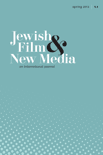
Jewish Film & New Media-An International Journal
Bridging Cultures: A Scholarly Journey Through Jewish CinemaJewish Film & New Media: An International Journal, published by Wayne State University Press, serves as a crucial platform for scholars and practitioners within the realms of Film Studies, Jewish Studies, and Media Studies. Since its inception, the journal has explored the intersection between Jewish culture and cinematic representation while also addressing contemporary media narratives. With an ISSN of 2169-0324 and E-ISSN 2169-0332, it is indexed in major databases, showcasing solid rankings in various disciplines, including a commendable Q2 rank in Visual Arts and Performing Arts. Despite its current Q4 categorizations in Anthropology and Communication, the journal is noted for its engaging contributions that sow rich discussions about Jewish identity, filmic expression, and media representation. Researchers and students alike benefit from the journal’s wealth of interdisciplinary scholarship, which spans converged years from 2013 to 2017 and 2019 to 2022, ensuring a robust timeline of critical inquiry. As an essential resource for understanding the nuances of Jewish film and new media, this journal occupies a unique niche, inviting contributions that push the boundaries of current academic dialogue.

Nordisk Judaistik-Scandinavian Jewish Studies
Advancing Scholarship on Jewish Culture and History in the NorthNordisk Judaistik-Scandinavian Jewish Studies is a distinguished academic journal dedicated to the exploration of Jewish culture, history, and religious practices in the Scandinavian context. Published by the DONNER INSTITUTE FOR RESEARCH ON RELIGIOUS AND CULTURAL HISTORY in Finland, this journal has been an open access platform since 2016, allowing easy dissemination of knowledge and fostering scholarly communication among researchers, educators, and students. With a variety of subjects encompassing Anthropology, Cultural Studies, History, and Religious Studies, the journal has achieved commendable recognition, with its latest rankings placing it in Q2 in several categories according to the 2023 Scopus rankings. The journal's significant contribution to the field is evident through its impact, evidenced by its strategic position within its respective quartiles. By bridging interdisciplinary methodologies and Jewish studies within a Scandinavian framework, Nordisk Judaistik serves as an essential resource for those engaged in the complexities and nuances of Jewish heritage and identity in the region.
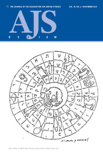
AJS Review-The Journal of the Association for Jewish Studies
Exploring Jewish Narratives and Heritage with Scholarly PrecisionAJS Review - The Journal of the Association for Jewish Studies is a leading academic journal published by the University of Pennsylvania Press, dedicated to advancing scholarship in Jewish studies. With its ISSN 0364-0094 and E-ISSN 1475-4541, the journal offers a rich compendium of research from various disciplines, including cultural studies, history, literature and literary theory, and religious studies. Recognized within the Q2 and Q3 quartiles across multiple categories in 2023, AJS Review provides an esteemed platform for academics to disseminate innovative ideas and engage with critical issues relevant to Jewish history and culture from 1976 to 2024. Although not an open-access journal, it ensures that high-quality, peer-reviewed articles are available to a global audience, enabling researchers, professionals, and students to foster deeper insights into Jewish narratives and heritage. By promoting interdisciplinary dialogue, AJS Review is integral to the academic community, offering valuable contributions to our understanding of Jewish studies and its broader implications.